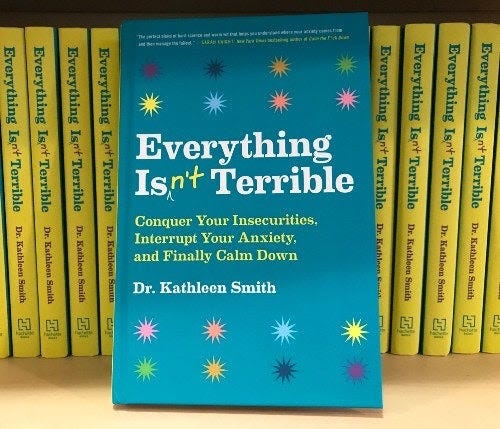Please Behave Better, So I Can Calm Down
Untangling Ourselves from Conflict
Conflict happens when:
Each person believes that the other needs to change.
We see calming down as the goal, but not a part of the solution.
We act as if our functioning/mood depend on people behaving better.
Have you ever had any of these thoughts?
I’ll be happy/calmer if they’ll just. . .
Text/call me more often.
Not tell me what to do.
Help out more around the house.
Stop criticizing me.
Share more of their thinking.
Let me help.
Make more romantic gestures.
Apologize.
Calm Down
Grow up.
When we are distressed, our emotional tentacles tend to reach outwards. We direct others in order to manage ourselves. Unfortunately, many of our efforts to get others to change encourage the very behaviors we’re trying to eliminate. A person who checks their partner’s phone can invite more distance and secrecy from them. A boss who micromanages your work doesn’t make you more eager to do it. If a friends demands that you call them more often, it doesn’t make you want to get to know them better.
This is because no one thrives under an anxious focus.
We are not responsible for people’s behaviors. We do not cause them. But the level of anxiety we bring to the relationship certainly affects how people function. We all know that kids don’t do well when we’re anxiously scrutinizing them. But we often fail to see this reality in our adult relationships.
In her book Extraordinary Relationships, Dr. Roberta Gilbert writes, “Differentiation of self has everything to do with one’s own emotional functioning. It has nothing to do with changing the other.”
Put that one on your mirror, right?
Working on your emotional functioning can look like:
Focusing on how you want to respond to other people’s undesirable behaviors.
Managing your own reactivity/immaturity in challenging relationships.
Fostering your own curiosity about the dilemma.
When you plug away at this, two things can happen:
You may become less allergic to others’ behaviors.
You may find that your own curiosity and calmness are contagious.
There is no magic in this. You cannot force people to grow up by behaving better. But when you begin to untangle yourself from the predictable relationship patterns we use to manage anxiety, every else’s position becomes a little more flexible as well. You make it a little easier for others to use the front part of their brain, the part that solves problems, sets goal, and strives for objectivity.
The beautiful thing about conflict is that it only takes one person to shift the focus back on themselves. Often no one wants to be the person who volunteers, because it often feels like admitting defeat. But if living a calmer and more thoughtful life is losing, then sign me up.
Some questions for you:
When have I been trying to force others to behave better?
When have others been trying to get me to behave better?
How can I keep working on my own maturity in these situations?
How can I keep working on lowering my reactivity in these situations?
News from Kathleen
September 24th - I’m presenting (virtually) all day at the Bowen Theory Education Center’s Annual Symposium about Staying Curious in an Anxious World. I’ll also show interviews I’ve done with people working on differentiation in their families and at work.
October 1st - I’m presenting (virtually) on Dating Apps and Anxiety at the Bowen Center’s Fall Fundamentals Conference, “Dating and Mating: Partnering With a Family Systems Lens.”
For Medium’s Forge Mag, I wrote about four simple questions that can help turn off your anxious autopilot.
Want to support my free newsletter? Buy me a coffee to keep the thoughts flowing.
Want to read more of my writing? You can read old newsletters at my website, or buy my book Everything Isn't Terrible from Amazon, Barnes and Noble, Indiebound, or your local bookstore (best option).
Want a free anxiety journal? Calming Down & Growing Up: A 30 Day Anxiety Journal includes thirty daily prompts to help you reflect on and respond to your anxious behaviors. To receive a copy, just email me your receipt.
Follow me on Twitter, Facebook, or Instagram, or email me if you have questions about Bowen theory coaching or having me speak to your group.
Want to learn more about Bowen theory? Visit the Bowen Center’s website to learn more about their conferences and training programs.




This is just so good.